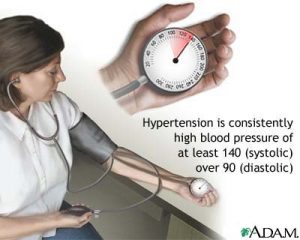Alternate Names : Hypertension – essential
Definition
Essential hypertension refers to high blood pressure with no identifiable cause.
Overview, Causes, & Risk Factors
As blood is pumped through your body, it exerts pressure on the walls of your arteries. The systolic blood pressure is the pressure against these walls when the heart contracts, and the diastolic blood pressure is the pressure against these walls when the heart relaxes. When you get a blood pressure reading, you are told the systolic pressure/diastolic pressure.
For example, normal blood pressure is below 120/80.
High blood pressure, also called hypertension, occurs when the systolic pressure is consistently over 140 mm Hg, or the diastolic blood pressure is consistently over 90 mm Hg. Blood pressure is determined by the amount of blood pumped, by the actions of the heart, and by the size and condition of the arteries. Many factors affect blood pressure, including:
- The amount of water in the body
- The amoutn of salt in the body
- The condition of the kidneys, nervous system, and blood vessels
- Various hormone levels in the body
Prehypertension is when your systolic blood pressure is between 120 and 139 or your diastolic blood pressure is between 80 and 89. If you have prehypertension, you are more likely to develop high blood pressure at some point. Therefore, your doctor will recommend lifestyle changes to bring your blood pressure down to normal ranges.
African Americans of both sexes and Caucasian males have a higher rate of significant hypertension. While essential hypertension has no correctable cause, some genetic factors have been identified. Blood vessels become somewhat stiffer as you grow older. For this reason, the rate of high blood pressure increases with age.
Pictures & Images
Monitoring blood pressure

Hypertension is a disorder characterized by chronically high blood pressure. It must be monitored, treated and controlled by medication, lifestyle changes, or a combination of both.
Untreated hypertension

Hypertension is a disorder characterized by chronically high blood pressure. It must be monitored, treated and controlled by medication, lifestyle changes, or a combination of both.
Lifestyle changes

Hypertension is a disorder characterized by chronically high blood pressure. It must be monitored, treated and controlled by medication, lifestyle changes, or a combination of both.
Hypertension

Hypertension is a disorder characterized by consistently high blood pressure. Generally, high blood pressure consists of systolic blood pressure (the “top” number, which represents the pressure generated when the heart beats) higher than 140, or diastolic blood pressure (the “bottom” number, which represents the pressure in the vessels when the heart is at rest) over 90.
-
Essential hypertension : Overview, Causes, & Risk Factors
-
Essential hypertension : Symptoms & Signs, Diagnosis & Tests
-
Essential hypertension : Treatment



Review Date : 6/4/2007
Reviewed By : Larry A. Weinrauch, MD, Assistant Professor of Medicine, Harvard Medical School, and Private practice specializing in Cardiovascular Disease,Watertown, MA. Review provided by VeriMed Healthcare Network.
The information provided herein should not be used during any medical emergency or for the diagnosis or treatment of any medical condition. A licensed medical professional should be consulted for diagnosis and treatment of any and all medical conditions. Call 911 for all medical emergencies. Links to other sites are provided for information only — they do not constitute endorsements of those other sites. © 1997- 2010 A.D.A.M., Inc. Any duplication or distribution of the information contained herein is strictly prohibited.
